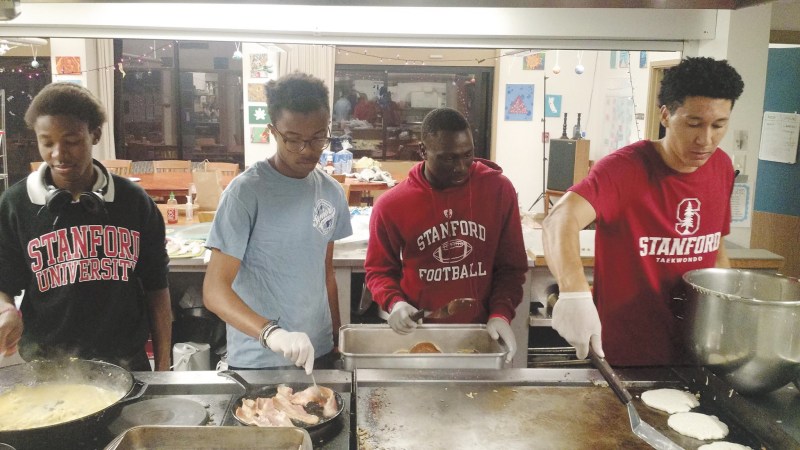As a bustling research university, Stanford has long been an incubator for start-ups and ideas — and thousands of pounds of leftover event food. After President Marc Tessier-Levigne’s inauguration, some 4,000 pounds of food were left uneaten. Thousands of pounds of prepared food also go uneaten every quarter in the dining halls.
But where do all the leftovers go? That’s where the Stanford Project on Hunger (SPOON) comes in.
SPOON is a student-led group on campus that seeks to alleviate the hunger problem in the Palo Alto community by salvaging uneaten food from dining halls, cafes and catered events around Stanford’s campus.
Financial officer and former co-director Annie Hu ’17 says she stayed with the group because she finds both the cause and the community a worthy commitment.
“Knowing the food is going somewhere worthwhile and not just the garbage [and] knowing that there’s so many people on campus who are willing to put in the time and effort to make this happen … has been really rewarding for me,” said Hu.
The work is not easy. Every quarter, SPOON’s board develops a weekly afternoon food pickup schedule for its volunteers. Members sign up for 30-minute shifts that begin with a trip to the Haas Center for Public Service, where they pick up aluminum tins for storing food. They then take these tins to the dining halls, where they collect and package excess food from the main lines — easily frozen items such as cooked meats, soup and pizzas. This food gets transported back to the Haas Center and stored it in freezers for pickup by representatives of the Ecumenical Hunger Program in East Palo Alto, which then redistributes the food to those in need.
This year’s co-presidents Niki Mani ’19 and Simar Malholtra ’19 have been working hard to expand SPOON’s presence across various eateries on campus. According to Mani, they recently succeeded in getting several more dining halls and cafes involved in the program. Dara Silverstein, who manages Residential & Dining Enterprises’s (R&DE) sustainable food program, is also currently working with interns to get all dining halls on board.
“Last year, we were only picking up from the Faculty Club and Russo Cafe. Those are only two places on campus, [but] we have nine dining halls on campus and [many] more cafes,” Mani said. “When we were taking over this role this year, [Simar] and I realized there was so much more food that’s being wasted, so our goal was to try to get all dining halls on campus on board.”
Volunteers in the student group spent much of fall quarter going to Stern and Ricker to lead staff members in training workshops on how to prepare food for collection, the types of food they can and cannot collect, and other logistics. Though the process has not been without its challenges, SPOON has succeeded in laying the foundation for excess food collection on Stanford’s campus for years to come. With the additional involvement of these dining halls, the group has the potential to easily surpass its prior record of 12,000 pounds of excess food collected over the course of a year.
Outside of food collection, SPOON also organizes a program called Breakfast Cooks, through which other student groups and dorms may register to cook breakfast together and serve it to homeless community members at the Palo Alto Opportunity Center. According to Hu, the group is currently working to increase student groups’ participation in this program, as well as the number of events from which SPOON collects food each year. For instance, the group also hopes to partner with Stanford Athletics to collect leftover food from basketball and football games.
One of SPOON’s recent collaborators is Students for a Sustainable Stanford (SSS), a connection facilitated by dining hall coordinator Chris LeBoa ’19, who also serves as an SSS project lead. Together, the two groups are working to implement an initiative in which ASSU will be funding compostable bags and trays to transport excess food for each student group after meetings and events.
They’re not stopping there, though. SPOON members are constantly searching for ways to optimize their food collection process on campus. According to Mani, some other items on the group’s to-do list include getting Dining Hall Ambassadors to act as facilitators between SPOON and dining hall staff and working with another hunger program called Peninsula Food Runners, which collects excess food from restaurants along University Avenue and the surrounding area.
“[Our] goal is to one day have it so Stanford takes it upon itself to get its extra food donated,” said LeBoa. “I would love to in the future see every dining hall … cafe … and student event have [its extra] food get picked up.”
Contact Claire Wang at clwang32 ‘at’ stanford.edu.
Correction: a former version of this article incorrectly stated that “1,400 pounds of food” are left uneaten every quarter from dining halls. It is actually an unconfirmed number somewhere in the thousands, which the updated article now reflects. The Daily regrets these errors.
